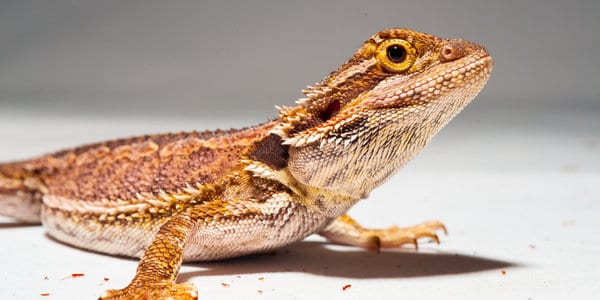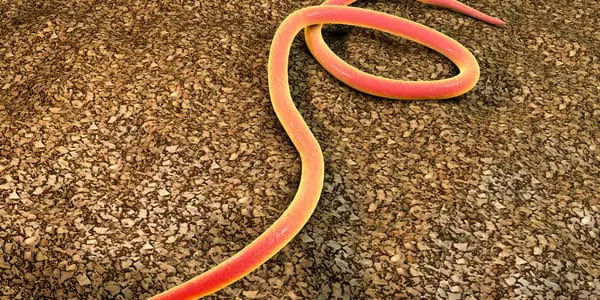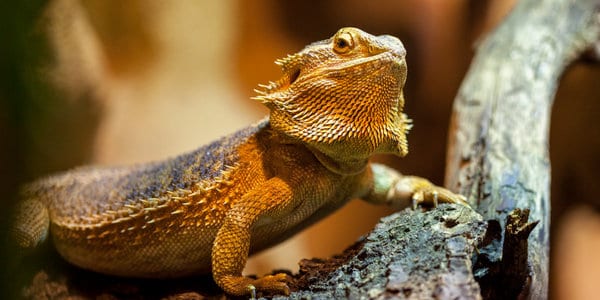Bearded dragon pinworms are among the most common internal parasites in reptiles. These worms can be found in the lower gastrointestinal tract of bearded dragons as well as other reptiles.
So, what exactly are pinworms? Knowing their signs, preventing them, and treating them is very useful for a healthy and happy pet. This article dives into everything you need to know about pinworms in bearded dragons.
What are Bearded Dragon Pinworms?
These are tiny parasitic worms that live in the lower end of the intestinal tract of bearded dragons. They leach most minerals and essential vitamins from their host, causing weakness and illnesses.
Many bearded dragons carry a small number of these worms in their body without showing any clinical signs.
If your bearded dragon has pinworms with any noticeable signs, you should seek the vet for proper diagnosis and treatment before the infestation worsens.
How Do Bearded Dragons Get Pinworms?
1. Feeder insects
A bearded dragon is likely to collect pinworms from insects. Crickets are the most popular culprit for this despite being nutrient-rich. You may decide to feed other feeder insects like locusts and dubia roaches, but these too may be infested.
Perhaps a better way to keep your beardie far from these nutrient suckers is by purchasing your feeder insects from a reputable supply store rather than obtaining them in the wild.
Because of free-range feeding, wild-caught insects are likely to carry pinworms and other internal parasites.
It’s still possible for feeder insects from farms with rigorous protocols to have these common parasites, but the chances are lower.
2. Unhygienic habitat
Another way bearded dragons get pinworms is a lack of regular cleaning. Pinworms hardly resist disinfectants and cleaners, so you just need to clean their habit regularly. Ensure you clean it regularly.
3. Not washing hands
Because beardies are social creatures, you’ll often handle them. Ensure you wash your hands before and after handling your reptiles to avoid transferring pinworms to your bearded dragons.
4. Other bearded dragons
Once a bearded dragon is infested with pinworms, it’s easy to spread it to other dragons in the same cage through their stool. If other pets touches the fecal matter, it’s likely to become infected with pinworms.

How Do I Know If My Bearded Dragon Has Parasites/worms?
The first sign of worms is lethargy, slow movement, and appearing sluggish. It’s as if something is off with your usually cute beardie. The appetite declines, and the beardie begins to lose weight fast. If so, there’s a possibility of a worm infestation. You can take a step further and see if there are worms in the stool.
If you notice any of these symptoms, the best bet is to take the dragon to the vet to confirm if she has any parasites and determines what treatment works best for her.
A fecal examination is the most effective way to find out what kind of parasites the beardie has. The fecal flotation or direct smear is the most common method used to find out the parasite problem.
Here are the symptoms of pinworms in bearded dragons include:
1. Rapid weight loss
One of the initial signs of pinworms in beardies is that they’ll rapidly lose weight. This is because these nutrient suckers affect the ability of the digestive system.
If the bearded dragon doesn’t break the food down, it means the food won’t be effectively absorbed. The inability to uptake nutrients from food leaves the dragon weak.
2. Lethargy
There are many reasons why your bearded dragon could appear lethargic or inactive. Pinworms are a possibility for this because the dragon lacks the nutrients it needs to support the body’s processes. If you notice lethargy, you should consult a vet immediately.
3. Loss of appetite
Beardies are likely to lose their appetite for food due to the discomfort that comes with pinworm infections. Similarly, there are many reasons why your dragon could lose appetite, but pinworms and parasites are a significant reason.
With decreased appetite, you may try offering a variety of foods, but if the problems persist, you should take the bearded dragon for a test.
4. Dehydration
Pinworms are known to suck water off bearded dragons. If the pet is frequently dehydrated, it might be time to check for pinworms.
Ensure you rehydrate the reptile as many times as you can and check with your vet sooner.
5. Diarrhea
Diarrhea is a common symptom of worm infestation. Signs of diarrhea include runny poop, blood stool, and changes in urates color.
If you notice these clinical signs, you need to consult your vet as soon as possible. Leaving diarrhea unattended could be disastrous for your bearded dragon.
Do Bearded Dragons Need To Be Dewormed?
Yes, you should consider deworming your bearded dragon for better health. This prevents the spread of parasites in their body and boosts their overall health.
Although pinworms won’t be transmitted to humans, beardies should be dewormed for them. It’s essential to take your beardie for regular vet checkups to the vet so they can examine them to maintain their health.
How Often Should You Deworm a Bearded Dragon?
You should deworm your bearded dragon twice a year if you are using an oral parasite preventative such as Panacur. On the other hand, if your beardie is an injectable medication like Pyrantel or Ivermectin, it should be dewormed once per year. You may also use both treatments, i.e., oral and injectable, once each year.
It’s also important to understand the different factors that influence the frequency of using these deformers. Typically, the dosage will be given orally and repeated for two weeks until the fecal test returns negative.
You also need to measure a dragon’s weight because you should deworm your pet based on their weight. To do this, take the weight, and if it’s between 1 – 3 grams, then you should deworm once.
How Should You Deworm a Bearded Dragon?
Being insectivorous, bearded dragons should be dewormed regularly using topical orals and injectables. Fenbendazole is the most commonly used for treating pinworms in beardies because it’s gentle and comes in both liquid and granular forms.
You can prevent infestation by keeping their cage clean and free of feces, food debris, and other dirt.

Diagnosis of Pinworms in Bearded Dragons
The most effective way to diagnose pinworms is to take them to the vet, who will perform a fecal flotation on the stool. This method determines the level of infestation in the body of the host.
The vet will then provide a bearded dragon dewormer to eliminate pinworms.
The vet will then provide more tips, including the bulk of responsibilities in the hands of the owner in ensuring good hygiene practices. Use of proper cleaning is essential to keep your dragon’s health optimum.
How to Treat Pinworms in Bearded Dragon?
Prophylactic treatment
One way to treat pinworms in beardies is through prophylactic treatment like a pre-emptive strike. This treatment procedure shows whether your dragon has pinworms without even showing any signs.
This treatment procedure relies on rigorous cleaning principles to fight pinworms and other parasites.
Prophylactic treatment of pinworms involves these steps:
● Thorough disinfection of your bearded dragon environment
● Use of vet-approved bearded dragon dewormer
● Regular visits to your bearded dragon’s vet
Prophylactic treatment is mainly used when your bearded dragon is asymptomatic. These pets may never exhibit any pinworm symptoms, but they may be the reason your dragon ends up with ailments later.
Symptomatic treatment
While some may not exhibit immediate symptoms of pinworms, some could experience one or more symptoms.
If your beardie shows any signs of pinworms, such as lethargy, loss of appetite, and lying flat, the use of symptomatic treatment is the most effective.
Post diagnostic treatment
Apart from pinworms, there are other worm infections that your dragons could get, making it harder to misdiagnose.
If you suspect that your pet has any worm-related infection, you may need to look for a more extensive diagnosis.
To do this, take your reptile to an experienced herpetologist or an exotic who should run a series of tests periodically.
Such a diagnosis could reveal other worm infestations and show you the right pathway to help your beardie.
How to Prevent Pinworms on Bearded Dragons?
1. Quarantine
If you have other bearded dragons in your environment, you need to keep them away from the sick ones to avoid the spread of pinworms.
It’s also essential to quarantine a newly-purchased bearded dragon and not rush it to the other beardies in the cage.
2. General treatment
The kinds of parasites that affect bearded dragons and other reptiles are different from the ones that affect humans. However, those who handle beardies must treat themselves with dewormers for caution.
3. Regular cleaning
Since pinworms are in the stool of beardies, cleaning the tank every day will help prevent an infestation.
That’s why you should consider a two-tank system so that the reptile stays in a separate tank while the other one is cleaned. However, having two tanks for one beardie is going to cost more.
4. Take quick actions
If you have noticed slight changes in your bearded dragon’s normal behavior, you shouldn’t wait.
Taking your pet to the vet immediately could be the difference between saving more bills and dealing with unexpected health consequences.
5. Purchasing a healthy bearded dragon
The best way to avoid pinworm complications is by making sure that you initially buy a healthy bearded dragon that’s free of any pinworms.
Healthy reptiles are also more likely to fight off pinworm infestations, and the vet-approved treatment will not be too tough on their health.
6. Routine deworming
Your bearded dragon needs frequent deworming to fight off pinworms before they can begin to infest.
Talk to your vet, and they will prescribe the proper dosage of vet-approved dewormers for your beardie.
7. Proper handling of fecal matter
The best way to avoid spreading pinworms within the beardie’s enclosure is by adequately handling the fecal matter.
You should remove the pet’s poop as soon as possible to prevent the beardie from spreading around.
You should spot clean the tank after collecting the poop and engage in regular full cleaning using a disinfectant to wipe out any pinworms.
8. Bathe your bearded dragon
You need to clean and bathe your bearded dragon properly to eliminate pinworms from their body.
Bathing is also an excellent way to ensure no new parasite attacks them. While bathing your beardie, ensure to use safe products so that no harmful worms develop on their body.
Can You Get Pinworms From Bearded Dragons?
Most animal parasites rarely affect people. In fact, most bearded dragons’ parasites are different from the ones that affect humans. In fact, the variants may not even affect other animals.
Still, you should practice proper good hygiene when dealing with bearded dragons, like washing your hands before and after handling a bearded dragon.
What is The Best Bearded Dragon Dewormer For Bearded Dragons?
Panacur – Dewormer is arguably the best for reptiles and specifically bearded dragons. This dewormer is used to treat a wide variety of parasites such as pinworms, roundworms, hookworms, lungworms, Heartworms, and worms in the liver.
Fenbendazole is effective, but it’s also a gentler alternative that won’t upset your beardie’s digestive system.
You can ensure more efficacy of the medicine by minimizing stress in their environment, such as poor sanitization, limited living space, insufficient food, and overcrowding.

How Long Can a Bearded Dragon Live With Parasites?
Bearded dragons can survive a parasite infestation if it’s caught in time and treated. However, weak juvenile bearded dragons often end up underweight and may not live for more than three months with a parasitic infection.
How Do You Treat Parasites in Bearded Dragons at Home?
For you to treat your bearded dragon at home, you will need to collect a fecal sample and take it to the vet to identify the exact parasites. The vet will then issue a dewormer prescription for your beardie and issue instructions for you to follow in terms of dosing and any changes in feeding that you might have to make.
What are The Symptoms Of Pinworm Infection in Bearded Dragons?
Pinworm infestation in bearded dragons often triggers poor appetite, weight loss, vomiting, abnormal-looking stool, diarrhea, and lethargy.
What Causes Pinworms in Bearded Dragons?
Pinworms are often caused by poor hygiene within the beardie’s living space and the presence of other household reptile pets with pinworm infestation.
Can Pinworms Kill Bearded Dragons?
Yes, When left untreated, pinworms can cause fatal health complications in bearded dragons.
The parasite is quite lethal to juvenile bearded dragons as they are often too weak even to eat.
Can Humans Get Pinworms From Bearded Dragons?
No, bearded dragon pinworms are reptile specific, and they do not pose a threat to humans.
These host-specific pinworms will, however, infect other reptile pets that come across.
How Do You Know If Your Bearded Dragon Has Parasites?
Some early signs that can help you find out if your bearded dragon has parasites include poor appetite, weight loss, regurgitation, and diarrhea.
The only confirmation involves taking a stool sample to the vet to determine if the beardie has parasites or not conclusively.
How Do You Treat Pinworms in Reptiles?
The only way to treat pinworms in reptiles is via strict adherence to proper hygiene and deworming medication.
Eliminate any sources of pinworms to prevent re infestation by disinfecting all the surfaces within the beardie’s terrarium.
How Much Does It Cost to Treat Parasites in Bearded Dragons?
Depending on the severity of the pinworm infestation, the cost of treatment might range from anywhere between $20 and $100.
Your vet will advise you on the best deworming medication, dosage and price.
You should also consider the cost of buying disinfectants to clean up the terrarium and eliminate any parasites that might still be remaining on the surfaces.
Can Bearded Dragons Recover From Parasites?
Yes, under proper care, regular deworming and hygienic living conscious bearded dragons can recover from parasitic infestations.
In some cases, the parasitic infestation may cause long-term health complications that your beardie may not live with for long.
How Do You Deworm Bearded Dragons?
The vet will provide the proper dewormer medication to treat the beardie’s pinworms. The most popular dewormers are Panacur and Fenbendazole, which are often administered in granular or liquid form.
The vet will also issue recommendations on cleaning and disinfectants that you need to clean the bearded dragon’s enclosure with to eliminate any pinworms that might cause a re-infection.
Final Thoughts
Bearded dragons are fantastic pets, but they need lots of care from their owners due to their sensitive nature.
The most common cause of pinworms is an unhygienic enclosure. You can prevent their infestation through regular daily cleaning and deep cleaning.
Don’t forget to take your bearded dragon to the vet if you suspect they have a pinworm infestation.